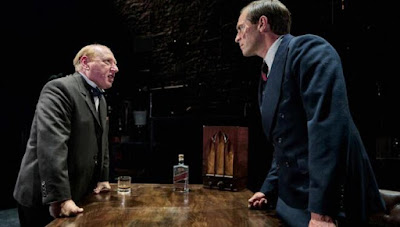Wireless Wars at the Donmar
When Winston Went to War with the Wireless has a fair bit of Churchill (and Clemmie) but is much more interested in John Reith and his moral dilemmas. I had a bit of luck with the seating for this performance as I had bought a standing ticket (I never mind standing for a play … means you can shuffle around a bit more) but there were a couple of unfilled seats and so the ushers anointed a couple of us with a place to sit down instead.
By Jack Thorne, this play looks at the days of the General Strike and the role of the youthful BBC through the relationship between Reith (Stephen Campbell-Moore), Churchill ( Adrian Scarborough) and Stanley Baldwin (Haydn Gwynne). I loved Gwynn as Baldwin and there were some great scenes between the main protagonists. The politics is balanced with another three way relationship between Reith and his former lover Charlie Bowser (Luke Newberry) and his wife (Mariam Haque) and there were great performances here too. This version of Reith is a troubled man, trying to navigate difficult personal relationships while also trying to protect his organisation from a complete takeover by Churchill and the government. We get some reflection on Churchill and his mistakes (in particular Gallipoli and the reintroduction of the Gold Standard) but Stanley Baldwin is the sharp operator here, getting Reith and Churchill to do what he wants while staying at arms length.
A very timely piece, set when a government has recently crashed the economy, and the general public are living in increasing poverty whilst industry and the government claims it cannot afford to pay better wages. And who has access to the microphone and gets to tell their side of the story becomes crucial. The distinction between State broadcaster and national broadcaster and the tensions still inherent today are explored, although without a real resolution. So it feels highly relevant at the moment.
The real beauty of this production though is in the loving homage to the strange and eclectic mix of programming, from a Woman’s Hour considering if women are more barbaric than men, to cockney comedians, strange sitcoms, singers and spoon players, with performances dotted throughout the play. There’s a joyous amount of sound effects produced on stage to accompany these interludes including tinsel to produce the sound of frying, and a spade to help with a sword fight. We had a nod towards the impact of wireless in people's daily lives as well as its role in national politics and culture, and it certainly made me reflect on the value of the ‘wireless’. The set for this production is lovely too with wireless fixed to the walls, microphones hanging from the ceiling and the back of the stage adorned with various gadgets which were actively used for the sound effects.
I gather the nature of Reith’s relationship with Charlie Bowser in real life is unknown as Reith deleted references to him from his diaries, but his tortured muddle of love and lies as seen here certainly added to the sense that sometimes it’s hard to be good. And the parallels between Reith’s struggles over the BBC and those with his love relationships are made clear as he tries to decide whether to be ‘good’ or support the ‘greater good’.
The lack of moral clarity at the end, while frustrating, was probably right. In the play, as in real life, everything ends up as a bit of a fudge.

Comments
Post a Comment